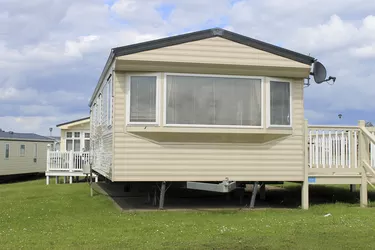
Mobile homes can serve as an affordable and flexible housing option. You can buy them with or for your own land or to place on rented space. These homes can also afford you tax breaks if you itemize tax deductions. Some deductions turn on whether you buy the mobile home from a dealer or as part of land.
Loan Interest
Video of the Day
Financing your purchase allows you to take an itemized deduction for mortgage interest. To qualify, the mobile home must serve as a residence and collateral for the loan. You can deduct interest even if the mobile home is a second home. If you rent out the second home, you must live in the home for at least 15 days or 10 percent of the time you rent it out, whichever is longer. On a land-home package, the interest on the portion for the land as well as the mobile home is deductible. You claim the mortgage interest deduction on Schedule A of Form 1040. Use Schedule C to write off interest as a business expense if you use the mobile home as part of your business -- as an office, for example.
Video of the Day
Points
Points you paid to land the loan, sometimes called loan origination fees, are deductible. If you buy for a residence, you can write off all the points in the year you took out the loan, so long as you pay them all. You must spread throughout the loan what you don't pay or if you don't use the home as a residence. For example, if you're charged $1,000 in points on a residential loan and pay $750 of it at closing, you can write off $750 in the year of the closing, but must take the rest of the $250 throughout the loan's life. Appraisal and document preparation fees don't qualify as points.
Mortgage Insurance Premiums
Your lender, if financing the land and home all as real property, may require you to have mortgage insurance if you don't front 20 percent of the purchase price. This insurance covers the lender's losses if you fail to make your mortgage payments. If you took out the mortgage in 2007 or later, you get to write off the premiums you paid in 2014 for mortgage insurance. As of the date of publication, the deduction for mortgage insurance premiums has not been extended past 2014.
Sales Taxes
You can deduct state and local sales taxes on the mobile home, but you must then forgo the break for state and local income taxes. The IRS limits the sales tax break to the general sales tax rate for your state, city or county. If the sales tax for mobile homes exceeds the general sales tax, you figure the deduction by multiplying the sales price by the general sales tax rate, not the higher one. You're not permitted to write off sales taxes if you buy a mobile home for business use. Also, if the mobile home is part of the real property when you purchase it, depending on the state the seller might face an excise or transfer tax. Even if it's passed on to you, the transfer tax is not deductible.
Property Taxes
Whether your mobile home is real or personal property, you can deduct property taxes. To qualify, the taxes must be based on the value of the home and the taxes must be assessed to all property owners. Charges for improvements such as sidewalks and sewer that serve your property but not others are not eligible. The seller may foot you with part of the property taxes on the mobile home, especially if you're buying land with it. You can write off the part you pay at closing in the year you buy -- along with property taxes, so long as you're the owner.